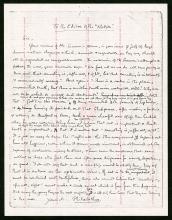BRACERS Record Detail for 131571
To access the original letter, email the Russell Archives.
BR sent the MS of the letter with his letter of 14 July 1918 to Ottoline Morrell (record 18680).
Letter 39
BR TO THE NATION, [14 JULY 1918]
BRACERS 131571. ALS. Texas. The Nation 23 (27 July 1918): 446; Papers 14: 99
Previous Brixton letter, BRACERS 18680; next letter, BRACERS 18681
Edited by K. Blackwell, A. Bone, N. Griffin and S. Turcon
To the Editor of the Nation.
Sir,
Your review2 of Mr. Sassoon’s poems,3 in your issue of July 13, lays down certain dogmas which, ancient and respectable as they are, should not be regarded as unquestionable. In criticism of Mr Sassoon’s attemptsa to portray the war, your reviewer says: “We feel not as we do with true poetry or true art that something is, after all, right, but that something is intolerably and irremediably wrong.” And again: “There is a value in the plain, unvarnished truth; but there is another truth more valuable still.” Why are we to be asked to accept such statements? Being toldb that “God’s in His Heaven”4 may in the end grow more wearisome to those who certainly are not there, and they may refuse to be put down byc being reminded of the serenity of Sophocles,5 and havingd it pointed out that Shakspeare,6, e after making a fortune and retiring to Stratford on Avon, took a more cheerful view of life than he did when he was writing King Lear. For my part,f I believe that art is important and that truth is important, and that the union of the two is very important, butg that it is untrue that “something is, after all, right.” It is just as easy to turn the “after all” the other way round, to point out how all happiness, even when it seems most innocent, is obtained at the expense of intolerable misery to others, and how even the emotions that seem noblest to those who feel them are often mere disguises for vanity, despotism, or greed. I do not say that such a view of life would be wholly true; I say only that it is as true as the optimistic view. If art is to remain living,h it must be combined with truthfulness; those who cannot believe that “something is, after all, right” must make and seek an art which is free from this dogma. And among the young they are the vast majority, for iti is not only their lives that they are losing in the war.
Yours etc.
Philalethes.7
- 1
[document] The letter was edited from a photocopy of the pseudonymously signed original in BR’s hand in the Morrell papers at the University of Texas at Austin. The letter appeared untitled in The Nation 23 (27 July 1918): 446, and as “On a Review of Sassoon” as 99 inPapers 14. The original manuscript was followed in The Brixton Letters, instead of the printed text (as in Papers 14), which BR could not have proofread.
- 2
Your review “Mr. Sassoon’s War Verses”, The Nation 23 (13 July 1918): 398, 400. Although the review was unsigned, BR discovered from Ottoline that it had been written by the critic J. Middleton Murry (see Letter 48).
- 3
Mr. Sassoon’s poems Siegfried Sassoon, Counter-Attack and Other Poems (London: William Heinemann, 1918). Russell’s library copy is annotated with vertical lines in two places. Ottoline had brought him a copy in prison (1 July 1918, BRACERS 114748).
- 4
“God’s in His Heaven” The line is from Robert Browning’s poem Pippa Passes (1841). It continues, “All’s right with the world!”
- 5
Sophocles Ancient Greek general, civic leader, religious leader — and great tragedian.
- 6
Shakspeare BR was suspicious of Shakespeare’s “common sense that made him a successful man of business” (letter to Ottoline, 3 April 1911, BRACERS 17073).
- 7
Philalethes “Lover of truth”, from the Greek. It was a frequently used literary pseudonym, including, notably, by Leibniz for the empiricist Locke in the former’s New Essays on Human Understanding (1765).
Textual Notes
- a
attempts The Nation printed “attempt”, as is done in 99 in Papers 14.
- b
Being told Replaced “Some of us are tired of being told”.
- c
may in the end … put down by Inserted.
- d
having After deleted “of being”.
- e
Shakspeare In this letter BR spelt the playwright’s name in his customary way, e.g. as he did in several letters in 1911. By 1924, in the manuscript of “How to Read History” (RA Rec. Acq. 27), BR had adopted the standard spelling.
- f
For my part, Inserted.
- g
and that the union of the two is very important, but Above deleted “and”.
- h
remain living Above deleted “be important”.
- i
for it Replaced illegible.

